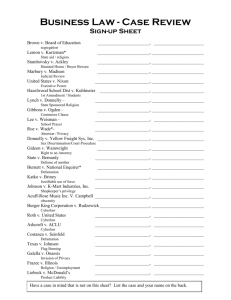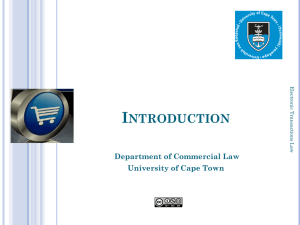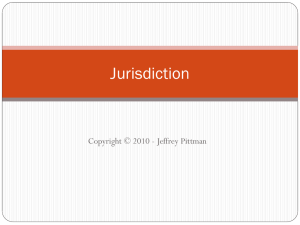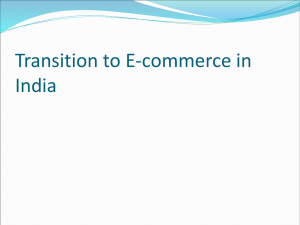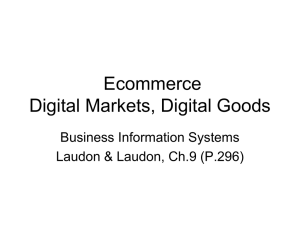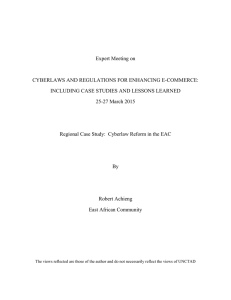Chapter 5 – Trade Secrets - Arkansas State University
advertisement
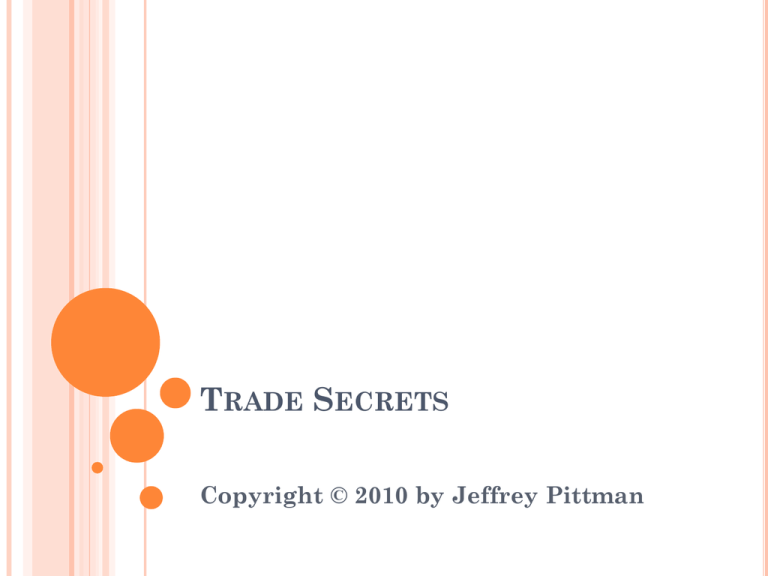
TRADE SECRETS Copyright © 2010 by Jeffrey Pittman WHAT IS A TRADE SECRET? Secret information owned or developed by a business that gives it a competitive advantage Pittman - Cyberlaw & E-Commerce 2 APPLICABLE LAW – TRADE SECRETS Federal Law - the Economic Espionage Act State Law - the Uniform Trade Secret Act Pittman - Cyberlaw & E-Commerce 3 TRADE SECRET SUBJECT MATTER Trade secret law protects information, including a formula, pattern, compilation, program, device, method, technique, or process, that: Pittman - Cyberlaw & E-Commerce Derives independent economic value from not being generally known or readily ascertainable by proper means by other persons, and Is the subject of efforts that are reasonable under the circumstances to maintain its secrecy 4 TRADE SECRET SUBJECT MATTER Pittman - Cyberlaw & E-Commerce Arkansas courts use a six-factor analysis in determining whether information qualifies as a trade secret: (1) the extent to which the information is known outside the business (2) the extent to which the information is known by employees and others involved in the business (3) the extent of measures taken by the company to guard the secrecy of the information 5 TRADE SECRET SUBJECT MATTER Pittman - Cyberlaw & E-Commerce Arkansas courts six-factor analysis (cont.): (4) the value of the information to the company and to its competitors; (5) the amount of effort or money expended by the business in developing the information; and (6) the ease or difficulty with which the information could be properly acquired or duplicated by others 6 MAINTAINING TRADE SECRETS Pittman - Cyberlaw & E-Commerce Companies should consider the following methods to protect trade secrets: Review all company operations and proprietary information to determine where trade secrets exist Use nondisclosure (confidentiality) agreements with all individuals having access to the trade secrets, including employees, officers, bankers, vendors, etc. Note the possible “inevitable disclosure” doctrine 7 MAINTAINING TRADE SECRETS Use noncompetition agreements (covenants not to compete) Pittman - Cyberlaw & E-Commerce A covenant not to compete is a contract clause where a person agrees not to engage in a specified business or occupation The covenant will identify the applicable time and geographic region, e.g., the employee will not leave the company's employ and work in the meat processing industry for the next two years, within the United States 8 MAINTAINING TRADE SECRETS Examine physical and network security issues: Restrict access to company trade secrets Utilize computer passwords, "confidential" stamps/legends, record-keeping procedures, entrance and exit interviews, etc. Pittman - Cyberlaw & E-Commerce 9 COVENANTS NOT TO COMPETE Covenants not to compete are disfavored by the law, especially in employment contracts In Arkansas, covenants not to compete will be upheld if the business has a legitimate interest to protect, and the time and geographic restrictions are reasonable (Federated Mutual Insurance Company v. Bennett, 818 S.W.2d 596 (1991)) Pittman - Cyberlaw & E-Commerce 10 COVENANTS NOT TO COMPETE Regarding employment contracts, legitimate business interests have been found where employees were provided special training, or allowed access to trade secrets, confidential business information, or customer lists (Girard v. Rebsamen Insurance Company, 685 S.W.2d 526 (1985)) Pittman - Cyberlaw & E-Commerce 11 “PROPER MEANS” Pittman - Cyberlaw & E-Commerce Trade secrets may be legally discovered by the following proper means: Independent invention “Reverse engineering", that is, starting with the known product and working backward to find the method by which it was developed (assuming the reverse engineering is not prohibited by contract) Discovery under a license from the owner of the trade secret Observing the item in public use or on public display Obtaining the trade secret from published literature 12 "IMPROPER MEANS" A partial list of improper means includes theft, bribery, misrepresentation, breach, or inducement of a breach of a duty to maintain secrecy or espionage through electronic or other means Pittman - Cyberlaw & E-Commerce 13 PROPER VERSUS IMPROPER MEANS Using a football analogy, it is legally permissible to discover your opponent's game plan through watching old films, or through independent analysis and guessing It is not permissible to acquire the opponent's game plan by theft or bribery of an opposing player Pittman - Cyberlaw & E-Commerce 14
